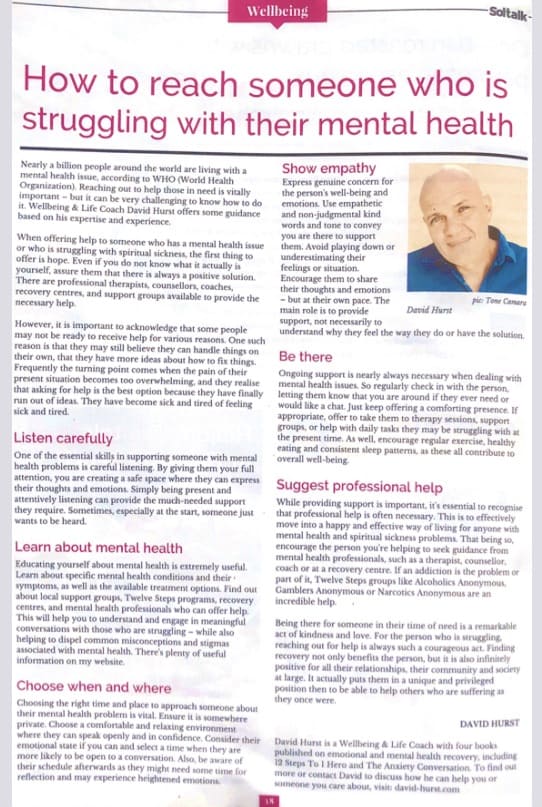How to reach someone who’s struggling with their mental health

Nearly a billion people around the world are living with a mental health issue, according to WHO (World Health Organization). Reaching out to help those in need is vitally important – but it can be very challenging to know how to do it. Here’s some advice based on my experience.
Give them hope
When offering help to someone who has a mental health issue or who is struggling with spiritual sickness, the first thing to offer is hope. Even if you do not know what it actually is yourself, assure them that there is always a positive solution. There are professional therapists, counsellors, coaches, recovery centres, and support groups available to provide the necessary help.
However, it is important to acknowledge that some people may not be ready to receive help for various reasons. One such reason is that they may still believe they can handle things on their own, that they have more ideas about how to fix things. Frequently the turning point comes when the pain of their present situation becomes too overwhelming, and they realise that asking for help is the best option because they have finally run out of ideas. They have become sick and tired of feeling sick and tired.
Listen carefully
One of the essential skills in supporting someone with mental health problems is careful listening. By giving them your full attention, you are creating a safe space where they can express their thoughts and emotions. Simply being present and attentively listening can provide the much-needed support they require. Sometimes, especially at the start, someone just wants to be heard.
Learn about mental health
Educating yourself about mental health is extremely useful. Learn about specific mental health conditions and their symptoms, as well as the available treatment options. Find out about local support groups, Twelve Steps programs, recovery centres, and mental health professionals who can offer help. This will help you to understand and engage in meaningful conversations with those who are struggling – while also helping to dispel common misconceptions and stigmas associated with mental health. There’s plenty of useful information on my website.
Choose when and where
Choosing the right time and place to approach someone about their mental health problem is vital. Ensure it is somewhere private. Choose a comfortable and relaxing environment where they can speak openly and in confidence. Consider their emotional state if you can and select a time when they are more likely to be open to a conversation. Also, be aware of their schedule afterwards as they might need some time for reflection and may experience heightened emotions.
Show empathy
Express genuine concern for the person’s well-being and emotions. Use empathetic and non-judgmental kind words and tone to convey you are there to support them. Avoid playing down or underestimating their feelings or situation. Encourage them to share their thoughts and emotions – but at their own pace. The main role is to provide support, not necessarily to understand why they feel the way they do or have the solution.
Be there
Ongoing support is nearly always necessary when dealing with mental health issues. So regularly check in with the person, letting them know that you are around if they ever need or would like a chat. Just keep offering a comforting presence. If appropriate, offer to take them to therapy sessions, support groups, or help with daily tasks they may be struggling with at the present time. As well, encourage regular exercise, healthy eating and consistent sleep patterns, as these all contribute to overall well-being.
Suggest professional help
While providing support is important, it’s essential to recognise that professional help is often necessary. This is to effectively move into a happy and effective way of living for anyone with mental health and spiritual sickness problems. That being so, encourage the person you’re helping to seek guidance from mental health professionals, such as a therapist, counsellor, coach or at a recovery centre. If an addiction is the problem or part of it, Twelve Steps groups like Alcoholics Anonymous, Gamblers Anonymous or Narcotics Anonymous are an incredible help.
Being there for someone in their time of need is a remarkable act of kindness and love. For the person who is struggling, reaching out for help is always such a courageous act. Finding recovery not only benefits the person, but it is also infinitely positive for all their relationships, their community and society at large. It actually puts them in a unique and privileged position then to be able to help others who are suffering as they once were.

This is my latest article for Soltalk magazine.
